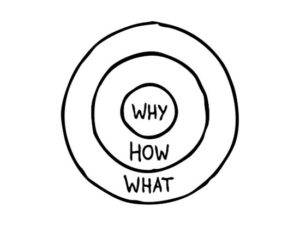There are many great business books written every year. But one of the best books of all time that has particular relevance right now is over a decade old. That’s ancient by today’s standard, but Simon Sinek’s “Start with Why: How Great Leaders Inspire Everyone to Take Action,” offers timely advice for modern law firm management.
We often struggle to explain why some businesses are successful and others are not. The same is true for law firms. Why would one firm excel and another fail when they basically have the same great lawyers and they’re operating in similar marketplace environments?
According to Sinek, many businesses, law firms included, all think, act and communicate the same way. He explains using a concept called the golden circle, depicted below.

Getting to ‘Why’
Every organization knows what they do, some know how they do it. But few companies and firms can effectively communicate the why. The easy answer is for profit, but profit is really just an outcome. The why that Sinek refers to is purpose, values and beliefs. This is an increasingly important concept today.
This is the opposite of how many companies operate. They can tell you, for example, that they make great widgets that are easy to use. Great widgets are neither inspiring nor compelling to customers. It’s the same in law firms. Every law firm has the best lawyers, an impressive list of clients, and a stellar reputation. But is that enough?
Why We Love Apple
Apple makes computers just like Dell and a whole host of other companies that we hardly remember. So why is Apple so successful? They have turned Sinek’s golden circle inside out. Before they tell you what they do, they tell you what they believe. As Sinek explains Apple’s philosophy, “Everything we do shows that we believe in challenging the status quo. We believe in thinking differently. The way we challenge the status quo is by making our products beautifully designed, simple to use, and user-friendly.” He continues, “We just happen to make great computers. Want to buy one?”
Well, as a matter of fact, we do. And, by the way, we’ll also take an MP3 player, mobile phone and a range of other products, from a computer company. Americans, heck, just about the whole world, fell in love with Apple’s why.
Can this apply to the legal industry? It better. Because law firms as much as any other industry cannot simply stand by and watch as their world becomes increasingly competitive. And, honestly, there are a few companies out there who have already turned the legal business model inside out. They’re called alternative legal service providers among other things. What’s more, recent surveys suggest that Gen Zers and millennials want to do business with – as well as work for – companies that align with their values.
The Brain’s Logic
Sinek’s golden circle model is not just a function of psychological mumble-jumble. It’s based on how the brain is wired. As it turns out, the brain corresponds (in simplistic layman’s depiction) to the circle. The neocortex of the human brain is the outer layer, the what level. It’s responsible for our rational and analytical thoughts and language. The two middle sections, the how and the why, are the limbic brain. The limbic brain is responsible for human behavior, decision-making, and feelings, like trust and loyalty.
So our communications about how great our lawyers are or how successful they’ve been is so much navel-gazing. Of course, potential clients do understand all of the features and benefits, facts and figures you provide them. But when it comes down to what drives behaviors and what brings clients to the table, it’s feeling. Before you worry that we’ve gone all kumbaya on you, there is science behind how we make decisions.
When we communicate from the inside out – starting with the why – we’re talking to the part of the brain that engages behavior. It’s where the so-called gut decisions come from. When you consider the data and then claim that something just doesn’t feel right, that’s the limbic brain driving the process.
How does this manifest itself in the workplace? Sinek says, “The goal is not just to hire people who need a job. It’s to hire people who believe what you believe.”
Why the Recipe for Success Doesn’t Always Work
The primary reasons people give when asked why their business failed are:
- Under-capitalized
- The wrong people
- Poor market conditions
If these are the true reasons for business failure, shouldn’t the opposite be true? Sufficient capital, the right people, and a great marketplace, should be the recipe for success. But there are many examples to prove that this isn’t the case.
Take the Wright brothers, for example. They should not have succeeded over Samuel Pierpont Langley. If you’ve never heard of Langley, it’s because he never went airborne and quit immediately after the Wright brothers took their first flight. Sinek loves this example. Langley was funded by the War Department, sat on the board at Harvard, and worked at the Smithsonian. He was frequently featured in New York Times, had access to the best minds, and had an engaged following just waiting for the seemingly inevitable event.
Yet, Orville and Wilbur beat him out with little more than the proceeds from their bicycle shop and a dream that the “flying machine” would change the course of the world. Langley, on the other hand, dreamed of being rich and famous and the people who worked for him were in it for the paycheck.
What Do Your Lawyers Believe?
It isn’t about how great your lawyers are or how impressive your list of clients is. It’s about what your lawyers believe. Do they believe that…
- they have a better, more effective way to deliver legal services?
- they are improving the lives of their clients?
- their law practice makes the highest and best use of a diverse range of talent?
- they are changing the way legal services are delivered?
- the associates they bring on will have the experience they want while making significant contributions to the practice?
These are the beliefs that, by the way, attract excellent clients, retain the most valuable employees, and position your firm for long-term sustainability. At least some of your competitors are out there selling these whys. For the firms that do this successfully, a big part of the how is process improvement and legal project management. We’ll discuss more about Sinek’s theories and the how in part 2.
References:
The Conversation – Is it rational to trust your gut feelings? A neuroscientist explains

